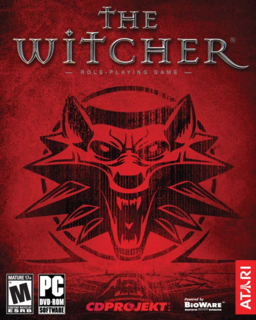With a colorful cast amid such a bleak setting, The Witcher offers an experience that is both edgy and deeply stirring.
Deviating from its stylistic predecessors where you craft your own hero (Baldur's Gate, KotOR, etc.), your hero is Geralt: a cynical amnesiac whose sense of identity may be lost but knack for sass is not. Choices in The Witcher are not simply good/bad choices (though there are a few choices that punish you for being a bad tactician). Geralt must often choose between two bad choices: do you side with a woman who was plotting to murder a town or do you maintain neutrality by letting them sort it out (and ultimately allow a terrorist, murder, rapist, and child trafficker to avoid karma)? Ultimately Geralt is Geralt, so the choices are tailored to what he would do (witchers gotta get paid, after all), but even so there is a wide array of realistic and difficult decisions to make in the game, offering a vast amount of replay value.
The setting is quite normal, and yet there's something off about it. Little details add to the game's atmosphere; maybe your amulet that senses magic vibrates at a time you don't expect or maybe looking up a monster in your bestiary raises questions about your clients. From the plague-ridden and shady Vizima to the rustic village with golden meadows and horrifying noonwraiths, The Witcher offers settings grounded in reality yet mystical and creepy. Except for the swamps. No one likes that part of the game.
Liking the combat varies from person to person. There's a sense of rhythm to it, but also a sense of repetition. It gets a little too easy past a certain point in the game (pretty much no matter how you choose to level up). Alchemy can be fun (I found it fun), but again, your mileage may vary.
The game has some issues in terms of plot and characters. Again, The Witcher sticks to typical fantasy conventions, some of which work (like the snooty elves and snarky dwarves, who have reasons for being that way). Others fail horribly. How does teleportation work in this world and what limits do mages have? Triss teleports to her location but you have to walk? You were both going to the same freakin place, we could have avoided the first third of the game of she'd just brought you with her or if you'd just sent a letter to the king. Why doesn't Triss just teleport the antagonists in the air or at the bottom of the lake? There are times when she conveniently does a spell that could have saved hours of the plot (not that those parts of the plot are bad, it's just that it feels like filler if there's a such a blatant solution that could have avoided it). Princess Adda needed more screen time as well, and maybe we'll see her (or not) in the final installment, but she needed more development since she was such a pivotal character.
Regardless of those plot holes, the story is strong and even has a few clever moments. The dialogue's a little rough, but it's not terrible and the actors (for the most part) are trying. The characters grow on you (especially Kalkstein and Zoltan). It's a game that puts Bioware's recent releases to shame. Definitely don't skip it to play The Witcher 2--it's a completely different experience, and one certainly worth taking your time with.

